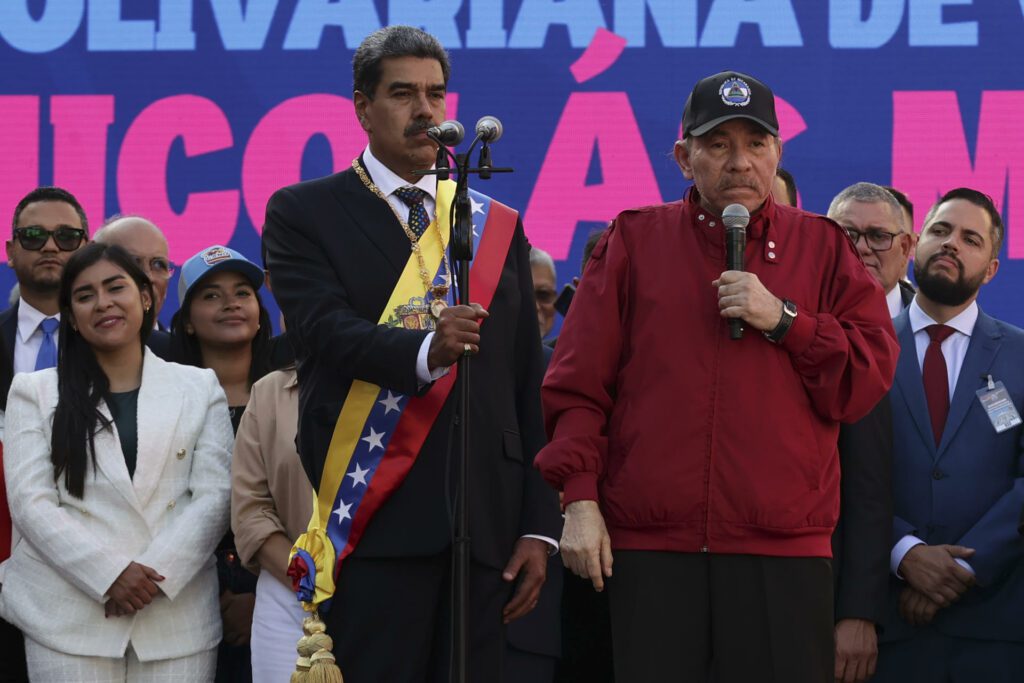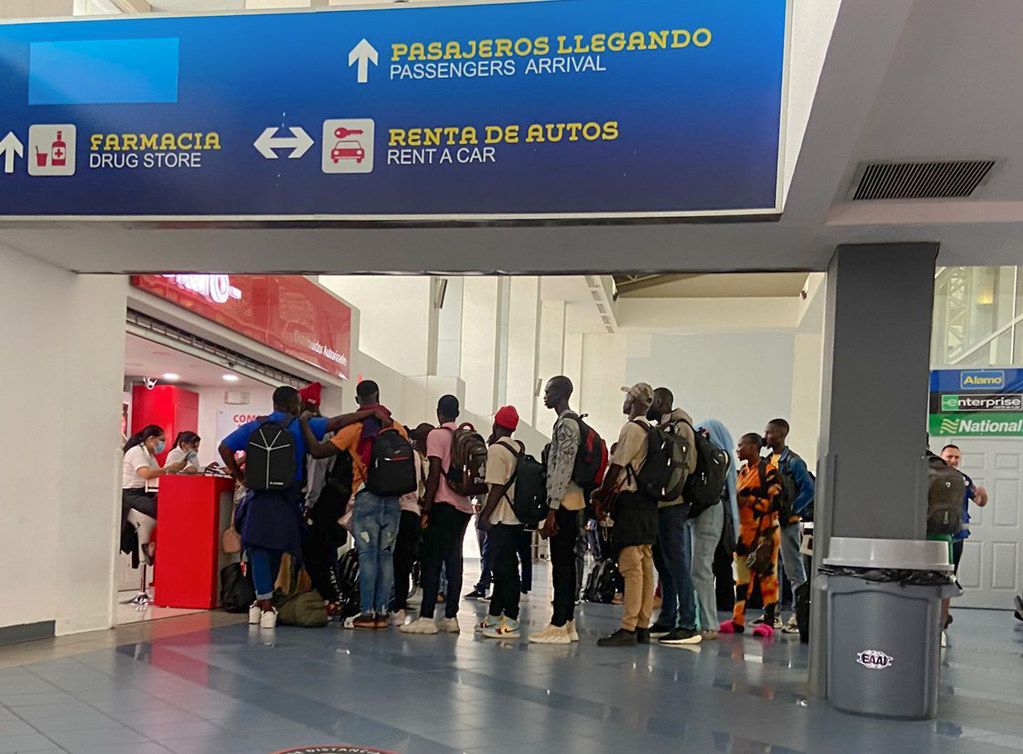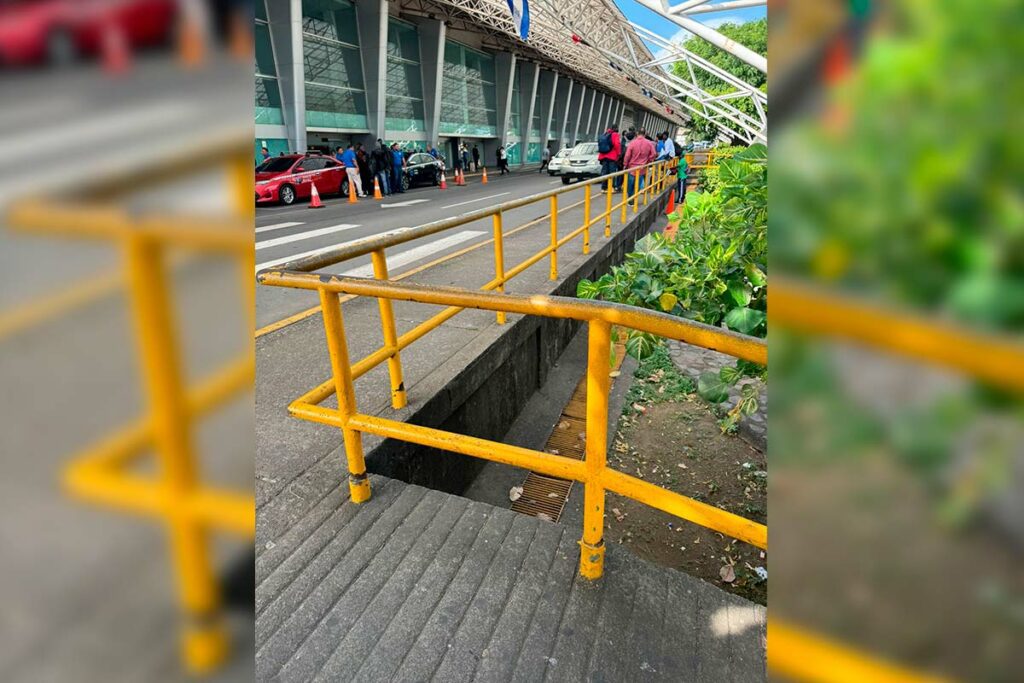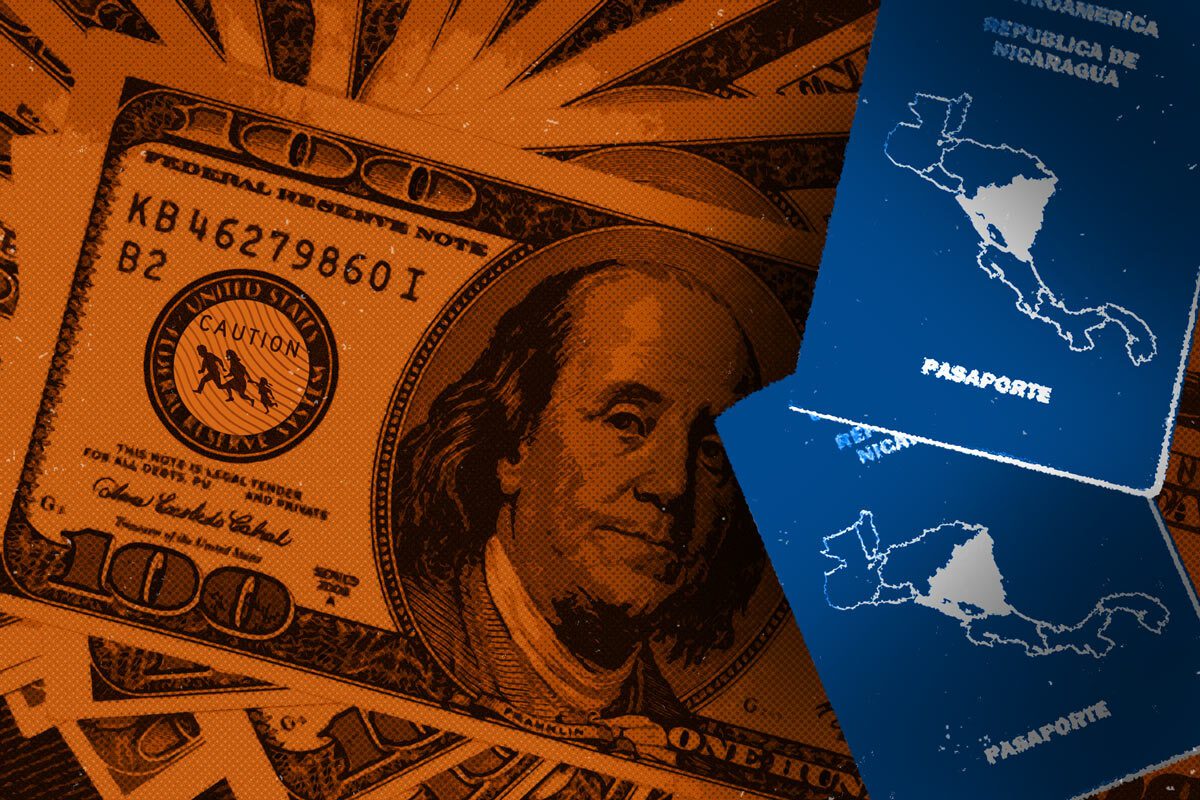Ernesto moves swiftly between cars, trying to sell a bag of chocolates he just bought at a supermarket in the capital. The traffic light changes from red to green in less than a minute, giving him little time to offer his product to drivers.
“This is fast, my friend. If I slow down, I don’t sell anything,” says the 35-year-old Venezuelan man, accompanied by his wife Gabriela and their two-year-old daughter. The family is passing through Nicaragua.
They entered the country in mid-September 2024 through unofficial crossings on the Costa Rica-Nicaragua border. Their goal: the United States. But to achieve it, they have faced many challenges, including the feared Darién Gap, where hundreds of migrants perish before ever reaching their American dream.
“Brother, when we got here, we had some savings for food. But Immigration charged us $180 each to enter. They say that fee is illegal, but it was either that or stay in Costa Rica,” Ernesto explains, pausing before returning to his sales. This time, he manages to sell five chocolates.
Nicaragua: A Springboard for Irregular Migrants
In recent years, Nicaragua has become a key transit hub for irregular migrants from different nationalities like Cuba, Venezuela, Haiti, Aruba, the Dominican Republic, and conflict-ridden countries in Eastern Europe, Asia, and Africa who seek to reach the U.S. by land or air.
The Ortega-Murillo regime has orchestrated a comprehensive logistical network and passed laws to facilitate migrant entry while profiting from it.
In August 2020, Nicaragua amended its General Law on Migration and Foreigners to impose a $150 fee for “entry and exit through unauthorized border points,” payable to the military or immigration officials upon crossing the border.
The fees are arbitrary. Sometimes migrants pay $150, but others, like Ernesto, are charged $180 or even $200 for this so-called “right of passage.” Since no receipts or passport stamps are issued, there is no proof of payment or official record of their transit through Nicaragua.
A Multi-Million Dollar Business for the Sandinista Regime
Budget reports from Nicaragua between 2019 and June 2024 confirm the regime’s increasing revenue from the surge in migration flows.
In 2019, before the $150 fee was introduced, Nicaragua’s Immigration Office collected only $10,839,407.74 from categories like “Other Migration and Foreign Services Fees,” “Airport Terminal Fees,” “Immigration Processing,” and “Stay Extensions.”
The following year, revenues rose to $18,323,564.32. By 2023, the figure reached a record $50,347,724.68, nearly five times the initial amount.
This unprecedented spike coincided with Nicaragua’s visa facilitation policies, allowing thousands of Cuban, Haitian, and African migrants to enter through Managua’s Augusto C. Sandino Airport. By paying for “safe passage” documents, they avoided the dangers of the Darién Gap and shortened their journey north. From Nicaragua, only three countries: Honduras, Guatemala, and Mexico stand between them and the U.S.
U.S. Sanctions and Crackdown
The U.S. responded with a series of sanctions, accusing the Ortega regime of profiting from migration and issuing a warning to airlines against “complicity in migrant exploitation.”
In May 2024, the U.S. Department of State accused the Ortega-Murillo administration of implementing “permissive migration policies” that enable networks to “exploit migrants for economic gain and encourage dangerous irregular journeys to the U.S.-Mexico border.”
By September, the U.S. imposed visa restrictions on “senior officials of a European charter airline” for “facilitating irregular migration to the U.S. via Nicaragua.” The specific individuals and airline were not disclosed.
“No one should profit from vulnerable migrants, not human traffickers, not private companies, not public officials,” said Department of State spokesman Matthew Miller. “We will continue imposing visa restrictions on owners, executives, and senior officials of unscrupulous transport companies.”
On January 16, 2025, the Department of State announced visa restrictions on individuals from 16 countries in Latin America, the Middle East, Europe, Asia, and Africa involved in facilitating irregular migration to the U.S. This included travel agencies, Nicaraguan government partners, and the private sector. As part of these measures, more than 70 charter flight routes, including those linking Nicaragua with Cuba and Libya, were shut down.
Although the crackdown has weakened the migrant business, it persists. Between January and June 2024 alone (full-year data is unavailable), Nicaragua collected $11.9 million (437,260,437.85 córdobas) from migration-related revenues. This projected total revenue of nearly $24 million for 2024, double the initial amount from 2019.
Ortega Regime Seeks to Preserve Migrant Business
As the Ortega regime tries to sustain its migrant business, it intensifies repression to expel Nicaraguans deemed problematic. According to migration expert Manuel Orozco, director of the Migration, Remittances, and Development Program at the Inter-American Dialogue, over 300,000 people entered the U.S. irregularly in the past two years after transiting Nicaragua.
Conversely, nearly 100,000 Nicaraguans emigrated in 2024. The majority, around 72,000 including those granted humanitarian parole, heading to the U.S.
In November 2024, the Ortega-Murillo administration approved reforms to Migration Law 761, legalizing deportations and entry/exit denials for Nicaraguans and foreign residents deemed a “social risk” or a “threat to national sovereignty.”
The reform imposes sentences of two to six years on Nicaraguans who enter, exit, or attempt to leave the country irregularly if suspected of “undermining national integrity, sovereignty,” or “conspiring or inciting acts of terrorism or economic/social destabilization.”
These repressive measures have long been used against political prisoners’ families, human rights defenders, religious figures, journalists, YouTubers, and influencers. The Nicaragua Nunca Más Human Rights Collective has documented 111 cases of de facto statelessness, in addition to the 451 people officially stripped of their citizenship by the regime.
A new $1,000 fine was also introduced for “evading border control for illicit purposes,” though enforcement details remain unclear.
Through irregular migration, Nicaragua has built a network generating millions annually, while the ruling couple’s oppressive policies have forced at least one million Nicaraguans to flee since the 2018 crisis.
For this report, interviews were conducted with stranded Venezuelans in Nicaragua, African migrants, human traffickers, migration experts, transport operators, and airport sources. Additionally, testimonies were gathered from Miskito exiles in Costa Rica, Nicaraguan exiles in Guatemala, and those granted humanitarian parole in the U.S.
Venezuelans Stranded in Nicaragua

“Brother, the Darién was tough. Carrying a child made it even harder. But we endured, and thanks to the solidarity of some Panamanians and Costa Ricans, we survived. But honestly, the hardest place for us has been here (Nicaragua), with all due respect,” Ernesto remarks, taking a sip from a plastic bottle he filled at a nearby house while selling chocolates on the roadside.
The difficulty Ernesto mentions is related to the number of days they have stayed in the country compared to the other nations they have traveled through. In Colombia, they walked for ten days; in Panama, it was eight; and in Costa Rica, another eleven. In Nicaragua, their money ran out, and their stay has been extended to 25 days, without a home and without food.
While Ernesto sells chocolates, Gabriela, his wife, waits under a tree holding their daughter. In Barquisimeto, she worked in a casino serving clients who frequently came to bet at table games. But when she got pregnant, her bosses marginalized her.
In a city where the law is not enforced, according to the Venezuelan woman, she was fired without compensation. The situation became more complex when Ernesto was also dismissed from his job as a security guard at a shopping mall.
“It is hard not to have food and not be able to give your daughter a happy life. That’s why we decided to leave Venezuela because over there, nobody does anything, and Maburro (Nicolás Maduro, dictator of Venezuela) and the opposition keep playing their games. I hope we get to the United States soon; at least I have family there who will help us find work,” expressed the 32-year-old woman.
“Money Moves at the Border”
The day this family entered Nicaraguan territory, at least 25 other Venezuelans did so with them. Ernesto remembers this well because the coyote who guided them to the northern border made a list to indicate the payment they had to make to the Migration officer who would charge for the “safe-conduct” to have free movement in the country.
All the Venezuelans on the list paid for the entry document, according to Ernesto. However, none of them received a receipt certifying the $180 payment. Using simple math, for the 25 Venezuelans, the Migration officer who charged for the “safe-conduct” pocketed $4,500 in one day.
“Not only Venezuelans pass through that border. Brother, there are also Cubans, people from Ecuador, Colombia, Haiti, and other countries. Money moves there, and you don’t even realize it. Man, I was shocked when the Migration officer pulled out stacks of twenty-dollar bills from a small pouch to give change,” he recounted.
After making that payment, Venezuelans like Ernesto, who do not have a larger budget, have no choice but to stay up to two months selling at traffic lights in Managua to gather money, eat, and continue their journey. The problem is that in the capital, they are unprotected.
Ernesto and His Family’s Fear While Fleeing Venezuela
It was difficult for Ernesto and his family to reach the capital. They were stranded for two days in the city of Rivas, near the Costa Rican border. There, thanks to the solidarity of a Nicaraguan woman, he was able to collect money from selling chocolates and continue to Managua, where the situation has been more complicated due to the cost of living and the lack of empathy.
“We are staying at a bus terminal nearby. There are other Venezuelans we met on the journey there. They are doing better because they found work selling. I hope they find something for me too,” says the man, who agreed to speak with DIVERGENTES and Artículo 66 on the condition that no details about his location or personal information be revealed.
Ernesto‘s fear was due to the National Police arriving for several days at the traffic light where he was selling. Although they did not ask for money, they warned him that if he remained in the country after thirty days, they would charge him another “safe-conduct.” According to the Venezuelan, a compatriot of his had to pay multiple times because he stayed in the country for almost three months.
“It’s not fear of people or thieves anymore, but fear of being charged more money and not being allowed to move forward,” Gabriela said.
By mid-September, Ernesto and his family had been in transit for 54 days, 25 of them in Nicaragua. Gathering money amid the rainy season and limited job opportunities extended their “stay” by two more weeks. Selling chocolates then turned into selling fried plantains with vinegar. Finally, on their 39th day in the country, they departed from Mayoreo Bus Terminal heading to Honduras in pursuit of their American dream.
“Here in Nicaragua, I am grateful to the churches that always gave us food. To a lady in a white SUV who gave me some money to move with my wife and daughter. In the end, I saw the solidarity of Nicaraguans, and thank God, Migration did not charge me more,” he said over the phone a day after leaving Managua.
The Flights of African Migrants

The coyote remains silent. It is a rainy Friday in November in Managua, and the city’s color turns gray. This somber atmosphere is comparable to our interviewee’s business, an Afro-descendant who speaks broken Spanish and confirms that business has been “a little bad” in recent months.
The coyote requested that he be identified with minimal details. While he remains in the country, he says he wants to stay unnoticed. “Call me Gustav, just without the ‘o,'” he says, smoking a cigarette smuggled into Nicaragua from China.
Gustav does not talk much. He gives short answers. From what little he shared, he is or was the contact in Nicaragua for coyotes managing the international migrant route from Africa to the United States. If a group wanted to land in the country, they almost certainly had to talk to him for reception and later transport to Honduras, where another contact awaited.
The business with African migrants arriving at Nicaragua’s airport during the first half of 2024 from El Salvador, Panama, and Europe represented an opportunity not only for the Ortega-Murillo regime but also for taxi drivers, private drivers, and street vendors working near Managua’s Augusto C. Sandino International Airport.
DIVERGENTES and Artículo 66 toured the airport during those months to speak with those involved in this new form of business, endorsed by the Sandinista dictatorship, which has gradually declined due to U.S. sanctions on entrepreneurs arranging charter flights for migrant transportation.
With Gustav‘s help, we were able to reconstruct the entire business scheme. Additionally, we interviewed migrants who wished to remain unidentified.
A visit to the Augusto C. Sandino International Airport revealed the presence of African migrants arriving from flights originating in El Salvador, Panama, and Europe. Inside and outside the airport, disorder was evident. In the Migration officers’ booths, long lines slowed down processing.
By October 2023, an average of 18 aircraft landed daily at Managua’s airport, mostly from Port-au-Prince, Haiti; the Dominican Republic; and Providenciales Island. Also, flights from Europe arrived via El Salvador and Panama.
These planes carried a significant number of Haitian, South American, and African migrants.
The Migration Business Hierarchy

At the highest level of the migration business are undoubtedly high-ranking officials of the Sandinista regime, linked to the National and International Airport Administration Company (EAAI). In 2022, a government report indicated $4 million in profits, but in 2023, earnings increased by 386%, exceeding $19 million.
According to sources, this booming business quickly led to the expansion and improvement of Punta Huete International Airport, located 58 kilometers northeast of Managua, to accommodate 3.5 million passengers and 2,000 flights annually.
In the intermediate level of the migrant business, there are the Immigration officials who make irregular charges to migrants in exchange for allowing them entry into the country, according to airport sources consulted by DIVERGENTES and Artículo 66. This “fee” can range between 50 and 250 dollars per person, depending on whether a family group is identified among the migrants.
At the lowest level are Nicaraguans like Gonzalo, taxi owners or drivers who wait in the airport parking lot to take migrants to the border with Honduras. There are also private drivers who, with the complicity of police officers and airport staff, make trips to the border. Below them, other taxi drivers wait outside the airport, hoping that foreigners will head to the road to offer them a lower price than the one inside.
In the airport parking lot, a group of about ten taxi drivers work daily, arriving around five in the morning to wait for travelers to take them to their destinations in Managua or to the Honduras border. They work with the permission of the airport authorities, to whom they must pay a fee for their presence in the area.
At 9:50 in the morning, they all crowd near the exit of the terminal. They are not concerned with the usual travelers. They are waiting for African, Haitian, and South American migrants whose next destination is Honduras. For Gonzalo, the twenty-something taxi driver who spoke with me for almost an hour, one of these trips is enough to make his day.
“If I take four Africans, I charge fifty dollars each. The trip costs them 200, and I make 130 because I put 70 in gas. The least I’ve charged is 180 because they like to haggle a lot,” says the young taxi driver, who has sometimes left the airport without any passengers.
Alongside Gonzalo are other drivers who approach African migrants to offer their services. “Go Honduras?” some ask, with an accent sometimes unintelligible. “Four in 200, baratus,” they reply, while most of the Haitians ignore the drivers and head to another part of the parking lot.
As the migrants ignore the taxi drivers, a colleague of Gonzalo approaches him and, with a gesture, points to the parking lot where other drivers, not from the same cooperative, are working under the direction of a police officer who walks back and forth.
Corrupt Police and Officials
The private drivers, in addition to working with this police officer, also collaborate with a man who could be mistaken for an African migrant, if it weren’t for the fact that he arrives at the airport every day to pick up foreigners who have prearranged their transport with him.
The cost, according to Gonzalo, is higher. However, the migrants don’t realize this and, “for safety,” they get into the vehicle of the man they agreed with days earlier for their trip to the border with Honduras.
“It’s a double game. We tell them we charge 200 (dollars) and that it’s cheaper, and the ‘little black guy’ tells them not to come with us because we’re dangerous. But the others are the dangerous ones who rip them off and charge 100 each,” the young driver explains.
Gonzalo says that when the intermediary steps in to bring migrants to the airport, or when the private drivers pull a group to take them, there’s no way to compete because they are backed by the police. “The best thing is to stay away from them and try to ‘pitch’ your group,” he said.
After having spent several days touring the airport terminal, DIVERGENTES and Artículo 66 confirmed that most of the Africans, Haitians, and South Americans are, for the most part, men. Unlike the Venezuelan groups who cross Nicaragua on foot and with their whole family, these groups travel with little luggage and dress well.
We also observed that, unlike the African or Haitian migrants, the groups of Cubans or Ecuadorians who travel to Nicaragua do not immediately head to the border with Honduras but wait a few days before continuing their journey to the United States. Gonzalo, who has transported these foreigners, says they have a bit more money and prefer to sleep in hostels on the day of their arrival in the country. Some even do a bit of tourism in the capital.
“It’s not like it was at the beginning”
Gustav allowed us to speak with a group of six African migrants who had just arrived in Nicaragua. Their English is poor. They can barely say yes or no. They are distrustful, which is why the conversation doesn’t go as deep as we’d like.
The group of six entered the country on two different flights. Apparently, due to the sanctions, national authorities no longer allow the flow of African migrants as they did at the beginning of the year. However, they continue charging the 150-dollar fee to enter the country, according to Gustav. “The blockade doesn’t let more brothers come,” says the coyote in somewhat understandable Spanish.
DIVERGENTES and Artículo 66 consulted sources from Augusto C. Sandino International Airport about why the number of flights carrying Africans has decreased, and therefore, the flow of these migrants in the country.
According to the sources, the sanctions on the businessmen who arrange charter flights for migrant trafficking have caused a shift in the business strategy, although to date, this new approach has not been as successful as earlier in the year.
“Two or three come in, but no more than that. The income is minimal compared to February or May of this year,” the source said.Meanwhile, Gustav says he is still in Nicaragua, waiting for instructions from his colleagues in other countries to know whether he will stay in Nicaragua or move to another country to continue “guiding,” as he calls it, his African brothers.





